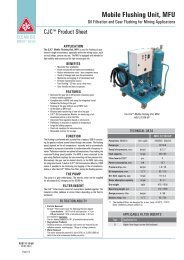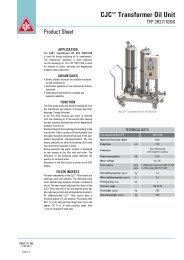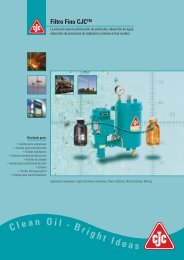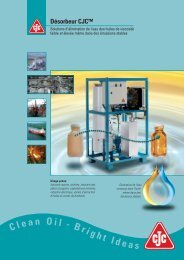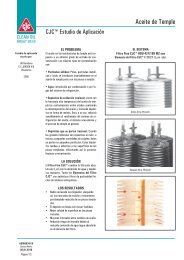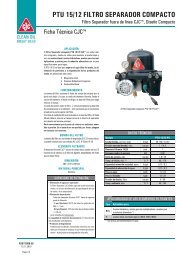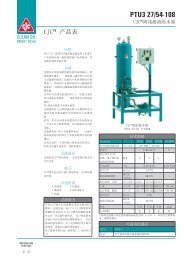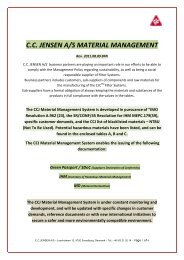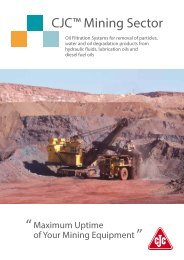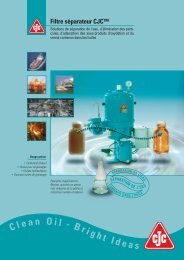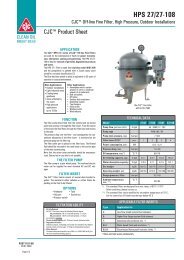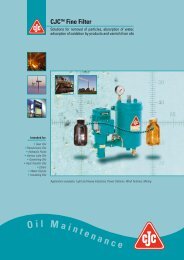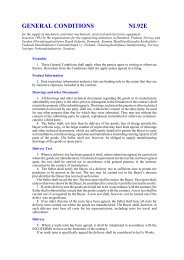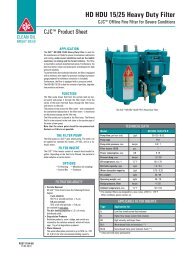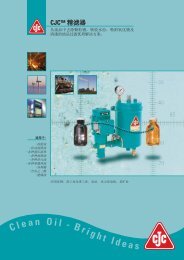Clean Oil - Bright Ideas, Company Profile - Cjc.dk
Clean Oil - Bright Ideas, Company Profile - Cjc.dk
Clean Oil - Bright Ideas, Company Profile - Cjc.dk
Create successful ePaper yourself
Turn your PDF publications into a flip-book with our unique Google optimized e-Paper software.
<strong>Clean</strong> <strong>Oil</strong><br />
<strong>Bright</strong> <strong>Ideas</strong>
<strong>Clean</strong> <strong>Oil</strong>, <strong>Bright</strong> <strong>Ideas</strong><br />
An introduction to the company C.C. Jensen A/S<br />
It is important that our customers know what C.C.Jensen A/S<br />
stands for; how the company started; how it has developed and<br />
not least: what they can expect of us in the future.<br />
In brief that has been our incentive to write and publish the book:<br />
as information to our esteemed customers.<br />
Yours sincerely<br />
Ulrich Ritsing<br />
Director, Sales & Marketing<br />
Filter Division<br />
C.C.Jensen A/S<br />
Published by: C.C.Jensen A/S, Løvholmen 13, 5700 Svendborg<br />
© C.C.Jensen A/S, 2003, 2006<br />
Idea: Ulrich Ritsing<br />
Text: MA. Erik Møller Nielsen & Torben S. Madsen<br />
Translation: TSMadsen<br />
Layout and printing: Tryk Team A/S, Svendborg
The short story<br />
The company C.C.Jensen<br />
1953- 2003<br />
C.C.Jensen A/S - a Danish industrial<br />
The growth layer of Danish industry largely consists of small and medium sized<br />
companies. Most of them family-owned like C.C.Jensen A/S.<br />
There are several obvious advantages to family companies: a short line of command<br />
and quick adjustment to changing conditions. More often that not the<br />
family company is characterized by a strong sense of responsibility: they care for<br />
their employees and customers, almost as were they family members. That was<br />
true for C.C.Jensen in 1953, just as it is for C.C.Jensen A/S today.<br />
The CCJ spirit<br />
The financial policy is a cornerstone of the company’s sense of responsibility.<br />
The principle of economical responsibility was also founded in the years after<br />
1953 when Mrs. Karen Jensen managed both the company’s bookkeeping and<br />
the household accounts. In the beginning the two sets of accounts were virtually<br />
the same. Invoices from the growing filter production, bills concerning purchase<br />
of clothes for the children, bills from the groceries store and many other private<br />
expenses were meticulously archived in cardboard boxes with handwritten titles.<br />
It is in these boxes we find the beginning of the story of C.C.Jensen.
4<br />
One of the first drawings of<br />
a CJC Fine Filter. The<br />
dawing is dated 1942,<br />
11 years before C.C.Jensen<br />
founded his own company.<br />
Note that the CJC<br />
triangle logo was is use<br />
already then.<br />
The good story<br />
One day, towards the end of the<br />
1930's, onboard m/v Marchen<br />
Maersk travelling from America<br />
to Japan, the first assistant<br />
engineer made his rounds in the<br />
engine room. For some time he<br />
had kept a watchful eye on oil<br />
drops leaking from a pipe connection<br />
in the engine’s lube-oil<br />
system. On this particular day<br />
he observed them very closely<br />
and incidentally a drop fell on<br />
his hand. Looking at the drop<br />
he could not help noticing how<br />
clear is was. Intriguing, because<br />
he knew that the oil flowing in<br />
the pipes was pitch dark from<br />
soot and blow-bys. He took a<br />
closer look and saw that the<br />
drop had been pressed out<br />
Chapter I<br />
The History<br />
through the gasket in the flangeassembly<br />
of the pipes. His<br />
immediate thought was that the<br />
gasket material had acted as - a<br />
filter!<br />
Roughly so, we imagine, were<br />
the circumstances inspiring<br />
marine engineer C.C.Jensen to<br />
develop a filter for the lubrication<br />
oil in the ship’s diesel engine.<br />
The facts are that he sailed on<br />
five different Maersk vessels<br />
from 1930 to 1937 and that his<br />
idea saw the light of day during<br />
this period. He did not himself<br />
make a note of that particular<br />
incident, but he must have told<br />
it to someone, because the<br />
story is still told in the company,<br />
and very often in more dramatic<br />
versions with the oil drop hitting<br />
him right on his nose and<br />
making him an inventor in that<br />
very moment. And maybe that<br />
was what happened - who<br />
knows?<br />
Before we in the following begin<br />
the ascertainable story of the<br />
company of C.C.Jensen, we<br />
must remember that at the time<br />
great inventions were often the<br />
work of a single man - and not<br />
like today, where inventions<br />
more often than not are the<br />
result of intense teamwork.<br />
The true story<br />
The inventor of the CJC Fine<br />
Filter and the founder of the<br />
company C.C.Jensen, Carl
Christian Jensen, was born in<br />
1906. Already at the age of 13<br />
he took lessons in mechanical<br />
drawing and in 1921 he started<br />
as an engineering apprentice.<br />
He and his family now lived in<br />
Svendborg and the largest and<br />
most complex factory in town<br />
became his workplace, namely<br />
Svendborg Steel Shipyard. His<br />
future course had been charted.<br />
The Marine Engineer<br />
The shipyard, established in<br />
1907, had in 1919 undergone<br />
an extensive modernisation and<br />
was now a modern, industrial<br />
company which, as customary<br />
at the time, comprised virtually<br />
all trades and professions. In<br />
other words: a well of knowledge<br />
to the inquisitive. That he<br />
would later return to the shipyard<br />
in another position and the<br />
yard would play an important<br />
role during the start of his own<br />
company, he did not know<br />
then.<br />
After six years’ apprenticeship<br />
he finished as a trained machine<br />
room operator in 1927 and was<br />
able to sign up for a ship. He<br />
had already been in contact<br />
with the shipping company<br />
A.P.Moeller so that same year<br />
he was hired for the first in a<br />
row of Maersk vessels. His first<br />
vessel was a steamer, s/s Hans<br />
Maersk (1916), which he signed<br />
on to in Naples.<br />
The sailor and the diesel<br />
engine<br />
1930 saw the beginning of the<br />
most important part of his sailing<br />
career. That was when he<br />
signed on to his first motor ship,<br />
the m/v Marie Maersk, as third<br />
assistant engineer. From his letters<br />
home we learn that this<br />
ship meant a considerable<br />
improvement to his working<br />
conditions - and it must have<br />
meant the world to him that he<br />
now worked with diesel engines<br />
- an almost virgin technology in<br />
seagoing vessels at the time.<br />
This was just 18 years after the<br />
first ocean going diesel-propelled<br />
vessel, m/s Selandia had<br />
returned to Denmark after her<br />
maiden voyage.<br />
M/v Marchen Maersk,<br />
one of the five Maersk vessels<br />
C.C.Jensen was signed on to.<br />
Carl Christian Jensen,<br />
founder of the company<br />
C.C.Jensen.<br />
Chapter I - The History 5
6<br />
Chapter II<br />
The Present<br />
Right now…<br />
When looking back in time as<br />
we have just done, it becomes<br />
clear how the C.C.Jensen A/S<br />
of today is the inevitable result<br />
of its history and the people in<br />
it. One may claim that everything<br />
is a result of its history, but<br />
in the present decade, where<br />
“branding” is the stated strategic<br />
objective of many companies,<br />
it is comforting to see that<br />
the values represented by the<br />
CJC brand are the result of a<br />
natural development of the<br />
company.<br />
Branding is not only a question<br />
of getting your name and trademark<br />
known. If the existing<br />
customers are to remain custo-<br />
mers - and if a company wants<br />
to win new customers - its<br />
products and trademark must<br />
not only be known, but renown.<br />
It is all about consistent quality<br />
and confidence; confidence in<br />
the products as well as in the<br />
organisation behind. Confidence<br />
is something you earn - and<br />
usually over a long period of<br />
time. When the C.C.Jensen<br />
sales people and representatives<br />
move in the fast-running<br />
world of today to sell the company’s<br />
products to new markets,<br />
new customers or new<br />
applications, they obviously do<br />
not have long time to earn the<br />
confidence. Consequently, it<br />
becomes very important that<br />
their self-confidence is impecca-<br />
ble - and there is no better<br />
basis for self-confidence than a<br />
solid foundation in company<br />
history.<br />
SALES & APPLICATIONS<br />
To illustrate both the diversity of<br />
the CJC products and the challenges<br />
presented to CCJ sales<br />
people, we will take a closer<br />
look at some of the important<br />
CCJ customer segments and filtration<br />
applications.<br />
Mining<br />
Although C.C.Jensen has supplied<br />
filtration equipment to<br />
mining machinery (crushers,<br />
excavators, etc.) the real breakthrough<br />
came not too long ago<br />
in Chile as the result of a very
dedicated effort by CCJ’s young<br />
subsidiary in that country. They<br />
had targeted the big Chilean<br />
copper mines as potential CJC<br />
customers, starting out with<br />
small off-line filter units for various<br />
mobile machinery. However,<br />
the big tractors, trucks, excavators<br />
etc. are not owned by the<br />
mine, but leased from the<br />
manufacturer, the large<br />
American company Caterpillar,<br />
who is also responsible for all<br />
maintenance. The oil for the<br />
equipment was to be supplied<br />
by the mine, who had made an<br />
arrangement with Esso Chile,<br />
who had established large oil<br />
storage facilities at the mine.<br />
Three parties with each their<br />
particular interest.<br />
It took some work and quite<br />
some time to convince the three<br />
parties that they had a mutual<br />
interest in improving the oil cleanliness<br />
of the oil for the machines,<br />
but in the end CJC Filters<br />
were installed on the large storage<br />
tanks and mobile filter units<br />
are used whenever the big mobile<br />
machines are serviced - and<br />
most of the stationary machines<br />
have been equipped with CJC<br />
Filters as well. It goes without<br />
saying that in a harsh environment<br />
as mining with heavy duty<br />
use, loads of dust and extreme<br />
temperatures, a stringent and<br />
continuous control of oil cleanliness<br />
is of utmost importance. As<br />
such, the mining industry constitutes<br />
an application sector very<br />
interesting to CCJ; the fine filtration,<br />
the water separation, the<br />
huge dirt holding capacity, the<br />
modular build and customized<br />
designs, and not least the deep<br />
knowledge of oil maintenance -<br />
all the CJC virtues are called for<br />
in the mining industry.<br />
As a spin-off, the Chilean project<br />
lead to the introduction of<br />
higher oil cleanliness standards<br />
within the entire mining area and<br />
CCJ is now cooperating with<br />
Caterpillar, the oil companies,<br />
the storage designer and the<br />
mines to improve the oil storage<br />
plants. And other CJC distributors<br />
around the world are already<br />
benefitting from the experience<br />
gathered in Chile.<br />
The Chilean CCJ crew inspects<br />
the oil filled rear differential<br />
of a gigantic 600<br />
tons mining truck<br />
Chapter II - The Present 7
8<br />
In Canada - also a major<br />
paper manufacturing country<br />
- the CJC distributor<br />
Klassen Speciality<br />
Hydraulics has successfully<br />
sold and serviced many<br />
CJC products to a variety of<br />
applications within the<br />
paper industry. Seeing<br />
Harvey Klassen in front of<br />
the paper machine gives an<br />
excellent impression of how<br />
huge these machines are.<br />
Pulp & paper industry<br />
C.C.Jensen A/S has a long<br />
history of supplying filtration<br />
equipment for paper machines.<br />
Around 1980 when the company<br />
had founded an in-house<br />
sales department, the first<br />
export market to be taken on<br />
was Sweden - a country with a<br />
huge pulp and paper industry.<br />
Virtually all prime processes in<br />
paper manufacture involves<br />
water. Particularly the huge<br />
paper machines where the pulp<br />
(basically cellulose fibres blended<br />
in water) is band pressed<br />
into big lanes of raw-paper, are<br />
prone to have their lubrication oil<br />
polluted with water.<br />
Consequently, the first Swedish<br />
CJC importer and their salesman,<br />
Birger Vesterlund, saw a<br />
huge potential for the CJC Filter<br />
Separator in this segment - and<br />
after a solid and long effort he<br />
succeeded and his work was a<br />
real boost for the use of large<br />
CJC Filter Separators in industrial<br />
applications (the Filter Separator<br />
was originally developed for<br />
the fine filtration and water separation<br />
on marine diesel fuels).<br />
The contact with the Swedish<br />
paper industry also played an<br />
important role in the development<br />
of the CJC Desorber. In<br />
the very large central lubrication<br />
systems of paper machines the<br />
water ingress rate is often so<br />
high that a conventional CJC<br />
Filter Separator would have to<br />
be extensively large to keep<br />
pace. Further, the lube oils used<br />
in paper machines often have a<br />
tendency (inherent or through<br />
wear) to dissolve large amounts<br />
of water. CJC Filter Separators<br />
cannot separate dissolved
water from oil, so a more<br />
“powerful” method had to be<br />
found. The answer C.C.Jensen<br />
came up with was desorption: a<br />
process where water is removed<br />
by blowing cool, dry air<br />
through the warm oil and the air<br />
“absorbs” the water. It would be<br />
wrong to say that the CJC<br />
Desorber was a hit right from<br />
the start, but as so often before<br />
a constructive cooperation between<br />
a customer and<br />
C.C.Jensen resulted in a valuable<br />
and viable solution. CJC<br />
Desorbers now consist of a<br />
range of types and models and<br />
the utilization of the desorption<br />
principle is still somewhat of a<br />
C.C.Jensen speciality.<br />
Today not only CJC Filter<br />
Separators and Desorbers are<br />
sold to the pulp and paper industry.<br />
The CJC products find use<br />
on a variety of applications:<br />
paper machines, defibrators,<br />
slap presses, refiners and bearing<br />
systems a.m.o. - and in<br />
almost all of the important paper<br />
manufacturing countries in the<br />
world.<br />
Steel industry<br />
Heavy industries such as steel<br />
production and milling are ideal<br />
CJC application areas. Tough<br />
operating conditions with heat,<br />
dust, dirt and cooling water<br />
enhances the need for high<br />
quality oil filtration solutions and<br />
the vast dirt holding capacity of<br />
the CJC Filter Inserts is a valuable<br />
sales argument. The history<br />
of CJC products in the steel<br />
industry goes back to the late<br />
1950's when C.C.Jensen’s<br />
German licensees, Karberg &<br />
Hennemann began selling Fine<br />
Although Denmark has only<br />
one actual steel mill,<br />
DanSteel, it has been a<br />
valued C.C.Jensen customer<br />
for many years. CCJ<br />
Sales Engineer Bjorn<br />
Martinsen (right) services<br />
Dansteel on a regular basis,<br />
letting the maintenance<br />
people benefit from CCJ’s<br />
experiences from steel mills<br />
all over the world.<br />
Chapter II - The Present 9
10<br />
Even a remote power transformer<br />
station in Canada<br />
can benefit from a CJC<br />
Vacuum Filter.<br />
Filters to the large, German steel<br />
manufactures. When C.C.Jensen<br />
established its own sales department<br />
the existing leads to the<br />
steel industries were inspiration<br />
to address similar customers in<br />
other countries.<br />
Over the years CCJ have supplied<br />
oil filtration solutions for many<br />
types of mills and machinery within<br />
the steel and related industries,<br />
mainly in European countries<br />
such as Great Britain, Sweden<br />
and Germany. Heavy industries<br />
in general is an important market<br />
segment to C.C.Jensen. As<br />
mentioned in the story of the<br />
Chilean mines sales above,<br />
heavy industry applications<br />
often require special solutions,<br />
customized and combined oil<br />
maintenance units. In brief, this<br />
an area where C.C.Jensens vast<br />
knowledge of filtration combined<br />
with the versatility of the entire<br />
range of CJC products have<br />
proved to be very efficient.<br />
Power generation<br />
industry<br />
Some of the biggest CJC Filter<br />
Separator units ever made have<br />
been supplied for maintaining<br />
the main lube oil on large power<br />
generation steam turbines. The<br />
CCJ organisation is in constant<br />
contact with the world’s major<br />
turbine manufacture and have<br />
frequently supplied oil maintenance<br />
equipment for new power<br />
plant projects.<br />
The use of CJC Filters within<br />
power generation dates back to<br />
the very start of the company<br />
C.C.Jensen - yes, even a few<br />
year before the start. As mentioned<br />
earlier in this book some of<br />
the very first CJC Fine Filters<br />
were tested and sold to local<br />
Danish power plants. Back then<br />
the “plants” were not that big<br />
and almost all of them had diesel<br />
powered generators, and the<br />
CJC Filter was used for cleaning<br />
the lube oil on these diesel engines.<br />
The later experiences from<br />
Germany with CJC Fine Filter<br />
units for turbine lube oil and not<br />
least from Sweden, where a<br />
great number of CJC products<br />
have been supplied for a variety<br />
of hydro turbine power genera-
Danish Power Station “Fynsvaerket”,<br />
a typical coal-fired steam<br />
turbine power plant - and a CCJ<br />
customer.<br />
tion related applications, have<br />
given C.C.Jensen a good insight<br />
in power generation technology<br />
and requirements.<br />
The use of isolating oil is a<br />
quite specialized application<br />
within power generation and<br />
distribution. Because of its<br />
electric isolating and coolant<br />
properties of certain types of<br />
oil, large industrial electric<br />
switch gears and transformers<br />
are oil filled. For an number of<br />
years C.C.Jensen has supplied<br />
filtration solutions for switch<br />
gears and on-load tap changers<br />
- even as original equipment<br />
to some manufacturers.<br />
In order to preserve the isolating<br />
and lubricating ability of the
12<br />
Justin Stover of C.C.Jensen<br />
Inc in Seattle, USA, responsible<br />
for CJC sales to the<br />
North American wind energy<br />
market, in good view of<br />
the market. CCJ Inc is<br />
represented in the American<br />
Gear Manufacturers<br />
Association and thus involved<br />
in describing future<br />
standards for gear maintenance.<br />
oil it is in switch gears important<br />
to continuously remove the<br />
many particles deriving from<br />
the hard metal-to-metal contact<br />
and sparking between the<br />
metal surfaces - and also to<br />
keep the humidity (water content)<br />
of the oil very low.<br />
Keeping the oil almost completely<br />
dry is even more important<br />
in power transformers. The presence<br />
of water and oxygen in<br />
the isolating oil may dramatically<br />
reduce the lifetime of a transformer<br />
as they accelerate the<br />
degradation of the oil and, not<br />
least, the paper isolation material<br />
in the transformer.<br />
With an ambition of being a fullscale<br />
filtration provider to the<br />
power industry, it was only natural<br />
when C.C.Jensen a few<br />
years ago started developing a<br />
dedicated transformer oil maintenance<br />
unit. In many ways the<br />
resulting product, the CJC<br />
Vacuum Filter, represents a step<br />
into a new world for CCJ. The<br />
Vacuum Filter combines a well<br />
known filtration method, the<br />
depth filter insert, with a new (to<br />
CCJ) technology: vacuum - the<br />
ideal method to remove even<br />
the slightest (water) humidity<br />
from oil and a fine supplement<br />
to the water removal technologies<br />
already mastered by CCJ,<br />
namely coalescing, absorption<br />
and desorption.<br />
Further, the oil chemistry of<br />
transformers is quite different to<br />
the traditional CJC applications:<br />
lubricating and power transmitting<br />
oils, so for the CCJ organisation<br />
to acquire the necessary<br />
knowledge of transformer technology,<br />
manufactures markets<br />
and customers has been a challenge,<br />
yet a rewarding one. It<br />
has brought the company pro-<br />
duct developments and insight<br />
from which not only the entire<br />
organisation, but also the traditional<br />
CJC products will benefit<br />
for years to come.<br />
Wind turbines<br />
Even though wind turbines -<br />
along with other renewable<br />
energy sources - strictly speaking<br />
is part of the power generating<br />
industry, they deserve<br />
specific mentioning in this<br />
account of CJC application<br />
areas. Around the turn of the<br />
century the state of the art wind<br />
turbines had become so large<br />
that the extreme load on their<br />
gearboxes called for improved<br />
oil maintenance. C.C.Jensen<br />
had the good fortune to have<br />
three of worlds major wind turbine<br />
manufactures on the Danish<br />
home market, so it was only<br />
natural for the company to seize<br />
this excellent opportunity to
Knowledge sharing of course<br />
involves the Danish technical<br />
back-up and back office<br />
functions. The support<br />
engineers have all relevant<br />
product information available<br />
on-screen.<br />
combine forces with the turbine<br />
manufactures in developing a<br />
CJC Off-line Fine Filter solution<br />
especially for wind turbine gearboxes.<br />
Obviously, success did<br />
not come overnight - but it<br />
came! Through a dedicated,<br />
serious effort and a continuous<br />
exchange of experience and<br />
knowledge with the manufacturers<br />
CCJ has sold more than<br />
15,000 Fine Filters to wind turbines<br />
worldwide during the last 6<br />
years.<br />
This would not have been possible<br />
without a coordinated<br />
sales and marketing work in the<br />
almost entire CCJ distribution<br />
channel, where both wind turbine<br />
manufactures and the after<br />
market have been targeted. The<br />
wind turbine adventure has<br />
taught the CCJ organisation the<br />
value of world wide knowledge<br />
sharing and joint efforts.
14<br />
PLC based, touch-screen<br />
system control and monitoring<br />
device on a CJC Heavy<br />
Fuel Conditioning Unit.<br />
Chapter III<br />
In their basics CJC filtration product<br />
are not technologically<br />
complex, but already now we<br />
make use of sophisticated electronics<br />
to monitor and control<br />
the operation of CJC filter units,<br />
thus enhancing the values and<br />
benefits of the mere fluid cleaning<br />
process. And this is just<br />
the beginning. In future advanced<br />
touch-screen PLC control<br />
The Future<br />
electronics will be available for<br />
more CJC products - and<br />
C.C.Jensen will allocate considerable<br />
resources to the research<br />
of sensoring and analysis<br />
technologies<br />
The sharing of knowledge and<br />
competent technical back-up<br />
are key elements in<br />
C.C.Jensen’s strategy for the<br />
future. We want CJC sales<br />
people to be the most competent<br />
within their field and we<br />
want our engineers and product<br />
specialist to be on the forefront<br />
of filtration technology development.<br />
The primary tools to<br />
achieve these ambitious objectives<br />
are extensive training and<br />
the utilization of information<br />
technology. Within the frame-
work of the CJC Univers we<br />
arrange practical and theoretical<br />
training lessons, both for the<br />
Danish based C.C.Jensen personnel<br />
and for sales people and<br />
technicians from the sales organisation<br />
worldwide.<br />
With the use of information and<br />
communication technology<br />
C.C.Jensen is able to offer training<br />
sessions as e-learning and<br />
able to share knowledge in virtual<br />
real time - and we will both<br />
broaden and deepen our know-<br />
ledge through networking with<br />
relevant organisations and research<br />
institutes. And we will do<br />
this to continue to be able to<br />
provide our customers with the<br />
best filtration solutions,<br />
In-house training session for<br />
production personnel. The<br />
topic: fault finding in electric<br />
circuits.<br />
The CCJ success on the<br />
wind turbine market meant<br />
a huge challenge to the<br />
Danish filter manufacturing<br />
departments. They had to<br />
increase production of certain<br />
filter models by a factor<br />
of five in very short time -<br />
and they did it! Having<br />
excelled under such pressure<br />
makes one proud and<br />
happy - and ready to take<br />
on future challenges.<br />
Chapter III - The Future 15
C.C.Jensen A/S<br />
– a Danish based international company<br />
Head office:<br />
C.C.JENSEN A/S • Denmark<br />
Løvholmen 13 • DK 5700 Svendborg<br />
Tel.: +45 63 21 20 14 • Fax: +45 62 22 46 15<br />
E-mail: filter@cjc.<strong>dk</strong> • www.cjc.<strong>dk</strong>



